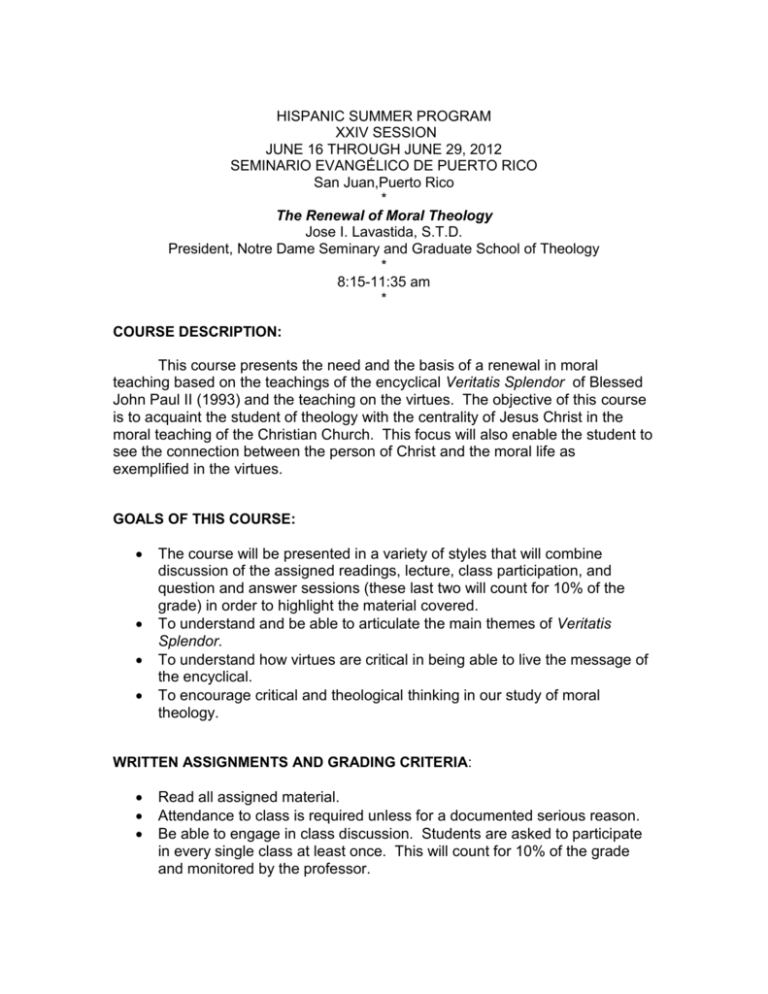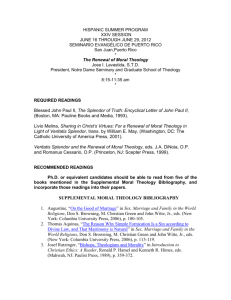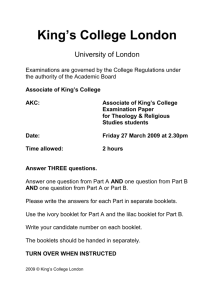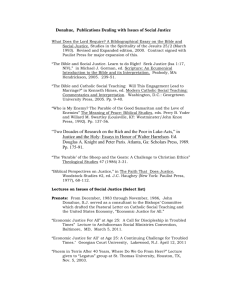HISPANIC SUMMER PROGRAM/PROGRAMA HISPANO DE VERANO
advertisement

HISPANIC SUMMER PROGRAM XXIV SESSION JUNE 16 THROUGH JUNE 29, 2012 SEMINARIO EVANGÉLICO DE PUERTO RICO San Juan,Puerto Rico * The Renewal of Moral Theology Jose I. Lavastida, S.T.D. President, Notre Dame Seminary and Graduate School of Theology * 8:15-11:35 am * COURSE DESCRIPTION: This course presents the need and the basis of a renewal in moral teaching based on the teachings of the encyclical Veritatis Splendor of Blessed John Paul II (1993) and the teaching on the virtues. The objective of this course is to acquaint the student of theology with the centrality of Jesus Christ in the moral teaching of the Christian Church. This focus will also enable the student to see the connection between the person of Christ and the moral life as exemplified in the virtues. GOALS OF THIS COURSE: The course will be presented in a variety of styles that will combine discussion of the assigned readings, lecture, class participation, and question and answer sessions (these last two will count for 10% of the grade) in order to highlight the material covered. To understand and be able to articulate the main themes of Veritatis Splendor. To understand how virtues are critical in being able to live the message of the encyclical. To encourage critical and theological thinking in our study of moral theology. WRITTEN ASSIGNMENTS AND GRADING CRITERIA: Read all assigned material. Attendance to class is required unless for a documented serious reason. Be able to engage in class discussion. Students are asked to participate in every single class at least once. This will count for 10% of the grade and monitored by the professor. Prepare point papers for every class which include a summary and the main points discussed in the reading assignment for the day. This point paper should be one page long, single spaced, 12 pt. Font, 1 inch margin throughout. Each point paper will be graded according to completeness and helpfulness for the class discussion. This will count for 30% of the grade. Complete successfully a final exam. Each will count for 30% of the grade.Present a paper of 10-12 pages on one of the virtues and how it is to be understood in light of Veritatis Splendor. This will count for 30% of the grade. (Papers will be due on the first Friday after the end of class.) REQUIRED READINGS Blessed John Paul II, The Splendor of Truth: Encyclical Letter of John Paul II, (Boston, MA: Pauline Books and Media, 1993). Livio Melina, Sharing in Christ’s Virtues: For a Renewal of Moral Theology in Light of Veritatis Splendor, trans. by William E. May, (Washington, DC: The Catholic University of America Press, 2001). Veritatis Splendor and the Renewal of Moral Theology, eds. J.A. DiNoia, O.P. and Romanus Cessario, O.P. (Princeton, NJ: Scepter Press, 1999). RECOMMENDED READINGS Ph.D. or equivalent candidates should be able to read from five of the books mentioned in the Supplemental Moral Theology Bibliography, and incorporate those readings into their papers. SUPPLEMENTAL MORAL THEOLOGY BIBLIOGRAPHY 1. Augustine, “On the Good of Marriage” in Sex, Marriage and Family in the World Religions, Don S. Browning, M. Christian Green and John Witte, Jr., eds. (New York: Columbia University Press, 2006), p. 100-105. 2. Thomas Aquinas, “The Reason Why Simple Fornication Is a Sin according to Divine Law, and That Matrimony is Natural” in Sex, Marriage and Family in the World Religions, Don S. Browning, M. Christian Green and John Witte, Jr., eds. (New York: Columbia University Press, 2006), p. 115-119. 3. Josef Ratzinger, “Bishops, Theologians and Morality” in Introduction to Christian Ethics: A Reader, Ronald P. Hamel and Kenneth R. Himes, eds. (Mahwah, NJ: Paulist Press, 1989), p. 359-372. 4. Augustine of Hippo, “On the Morals of the Catholic Church” in Basic Writings of Saint Augustine, vol. 1, Whitney J. Oates, ed. (New York: Random House, 1948), p. 319-357. 5. Thomas Aquinas, “Summa Theologiae” and “Summa Contra Gentiles” [selections] in J. Philip Wogaman and Douglas M. Strong, eds. Readings in Christian Ethics: A Historical Sourcebook (Louisville, KY: Westminster John Knox Press, 1996), p. 89-105. 6. Richard M. Gula, “Conscience” in Christian Ethics: An Introduction, Bernard Hoose, ed. (Collegeville, MN: The Liturgical Press, 1998), p. 110-122. 7. Bernard Häring, CSsR, “Conscience: The Sanctuary of Creative Fidelity and Liberty” in Introduction to Christian Ethics: A Reader, Ronald P. Hamel and Kenneth R. Himes, eds. (Mahwah, NJ: Paulist Press, 1989), p. 252-280. 8. Josef Fuchs, SJ, “Basic Freedom and Morality” in Introduction to Christian Ethics: A Reader, Ronald P. Hamel and Kenneth R. Himes, eds. (Mahwah, NJ: Paulist Press, 1989), p. 187-198. 9. Thomas Aquinas, “On Murder” in Summa Theologiae [II-II, Q64], trans. Fathers of the English Dominican Province (New York: Benziger Bros., 1948), p. 14591466. 10. Josef Fuchs, “Good Acts and Good Persons” in John Wilkins, ed. Considering Veritatis Splendor (Cleveland: Pilgrim Press, 1994), p. 21-26. 11. National Conference of Catholic Bishops, Economic Justice for All: Pastoral Letter on Catholic Social Teaching and the U.S. Economy (Washington, D.C., United States Catholic Conference, 1986), p. 32-49. 12. Marciano Vidal, CSsR, “Structural Sin: A New Category in Moral Theology”, in History and Conscience: Studies in honor of Father Sean O’Riordan, CSsR, Raphael Gallagher, CSsR and Brendan McCovery, CSsR, eds. (Dublin: Gill and Macmillan, 1989), p. 161-180. 13. John Howard Yoder, “The Just-War Tradition in Its Medieval Context” and “Criteria of the Just-War Tradition” in When War Is Unjust: Being Honest in JustWar Thinking, 2nd ed. (Maryknoll, NY: Orbis Books, 1996), p. 8-18, 147-161. 14. Thomas Aquinas, “Of War” in Summa Theologiae [II-II, Q40], trans. Fathers of the English Dominican Province (New York: Benziger Bros., 1948), p. 13531357. 15. Leonardo Boff, OFM, “Active Nonviolence: The Political and Moral Power of the Poor”, Pax Christi USA, Spring 1991, p. 22-23. 16. Kenneth R. Himes, O.F.M., “Intervention, Just War, and U.S. National Security,” Theological Studies 65 (2004), p. 141-157. 17. Daniel Callahan, “The Roman Catholic Position” in Abortion: A Reader, Lloyd Steffen, ed. (Cleveland: The Pilgrim Press, 1996), p. 82-93. 18. James Tunstead Burtchaell, C.S.C., “Condemnation of Abortion and Infanticide in the Early Church” in Abortion: A Reader, Lloyd Steffen, ed. (Cleveland: The Pilgrim Press, 1996), p. 94-104. 19. Congregation for the Doctrine of the Faith, “1974 Declaration on Procured Abortion” in Abortion: A Reader, Lloyd Steffen, ed. (Cleveland: The Pilgrim Press, 1996), p. 107-119. 20. John Van Regenmorter, “Frozen Out: What to Do with Those Extra Embryos” in Christianity Today, July 2004, 32-3. 21. James C. Peterson, “Is a Human Embryo a Human Being?” in Brent Waters and Ronald Cole-Turner, eds. God and the Embryo: Religious Voices on Stem Cells and Cloning (Washington, DC: Georgetown University Press, 2003), p. 77-87. 22. Pontifical Academy for Life, “Declaration on the Production and the Scientific and Therapeutic Use of Human Embryonic Stem Cells” in Brent Waters and Ronald Cole-Turner, eds. God and the Embryo: Religious Voices on Stem Cells and Cloning (Washington, DC: Georgetown University Press, 2003), p. 163-171. 23. Bryan N. Massingale, “James Cone and Recent Catholic Episcopal Teaching on Racism,” Theological Studies 61 (2000), p. 700-730. 24. Maurizio P. Faggioni, O.F.M., “An HIV-Infected Woman Seeking to Have Children” in Catholic Ethicists on HIV/AIDS Prevention, James F. Keenan, S.J., ed. (New York and London: Continuum, 2000), p. 246-254. 25. South African Bishops Conference, “A Message of Hope: From the Catholic Bishops to the People of God in South Africa, Botswana and Swaziland,” promulgated July 30, 2001. 26. Compendium of the Social Doctrine of the Church (Washington, DC: United States Conference of Catholic Bishops, 2004) by the Pontifical Council for Justice and Peace. 27. Catechism of the Catholic Church, 2nd ed. (New York: Doubleday, 2003) by the U.S Conference of Catholic Bishops. 28. Wogaman, J. Philip. Christian Ethics: A Historical Introduction. (Lousville: Westminster John Knox Press, 1993). 29. Our Moral Life in Christ. (College ed.) Peter Armenio. Midwest Theological Forum, 2009. Clear, straightforward presentation of the basics. Recommended for teachers. 30. Introduction to Moral Theology. Romanus Cessario. CUA Press, 2001. Contains some useful material and a good resource on Natural Law. You might find this helpful if you are looking for resources for teaching adults on an advanced level. 31. The Lord's Sermon on the Mount. St. Augustine. Paulist Press, 1948. Everyone should read this at least once in their life. 32. Living the Truth in Love: A Biblical Introduction to Moral Theology. Benedict Ashley, O. P. Alba House, 1996. This book is quite useful if you want a straightforward treatment of the virtues with a reference to the Catechism. 33. The Moral Virtues and Theological Ethics. Romanus Cessario, O.P. University of Notre Dame Press, 1991. This book has a good treatment of Prudence. 34. A Course in Thomistic Ethics, D. Q. McInerny. Indispensible for any budding Thomist. 35. Moral Theology. Heribert Jone, OFM, adapted by Urban Adelman, OFM. Newman 1946 (Tan edition). Easy to obtain. 36. Cessario, R. The Moral Virtues and Theological Ethics. ND Press, 1991. 37. Pinckaers, S. The Sources of Christian Ethics. CUA Press, 1995. 38. Veritatis Splendor, John Paul II, 1993. 39. Selections from the Summa Theologiae, Thomas Aquinas (in English) http://www.home.duq.edu/~bonin/thomasbibliography.html 40. Mahoney, J. The Making of Moral Theology. Oxford, 1989. 41. CONGREGATION FOR THE DOCTRINE OF THE FAITH. Donum Vitae (available online at:http://www.vatican.va/roman_curia/congregations/cfaith/documents/rc_con_cfa ith_doc_19870222_respect-for-human-life_en.html) [DV] 42. CURRAN, CHARLES E. Catholic Social Teaching 1891-Present: A Historical, Theological, and Ethical Analysis (Washington, D.C.: Georgetown University Press, 2002). [CST] 43. . “Official Catholic Social and Sexual Teachings: A Methodological Comparison,” in Curran and R.A. McCormick, S.J., Dialogue about Catholic Sexual Teaching: Readings in Moral Theology No. 8 (Mahwah, NJ: Paulist Press, 1993), 536-58. [OCS] 44. O’BRIEN, DAVID and THOMAS SHANNON. Catholic Social Thought: The Documentary Heritage (Maryknoll, N.Y.: Orbis Books, 1992). [DH] 45. U.S.C.C.B. “Forming Consciences for Faithful Citizenship: A Call to Political. Responsibility from the Catholic Bishops of the United States” Washington, D.C.: U.S.C.C.B., 2007). 46. Catholic Bioethics and the Gift of Human Life, William May, (Our Sunday Visitor, 2000) 47. An Introduction to Bioethics, by Thomas A. Shannon (Paulist Press, 1997) 48. John Paul II: Evangelium Vitae (The Gospel of Life); 49. ____________Salvifici Doloris (On The Christian Meaning Of Human Suffering). 50. Thomas Aquinas, Summa Theologiae II – II, QQ. 151, A. 1,2, 4; 152, A. 4 and 153, A. 1,2 51. Turner, Philip. “Sex and the Single Life” First Things 33 (May, 1993): 15-21 52. Bishops' Committee on Marriage and Family, "Always Our Children: A Pastoral Message to Parents of Homosexual Children and Suggestions for Pastoral Ministers." USCCB. www.usccb.org 53. Congregation for the Doctrine of the Faith. “Letter to the Bishops of the Catholic Church on the Pastoral Care of Homosexual Persons.” 1 Oct. 1986, www.vatican.va 54. Thomas Aquinas, OP, "The reason why simple fornication is a sin...", in Summa Contra Gentiles. Book Three. Vernon J. Bourke, transl. Univ. Notre Dame Press, Notre Dame, IN, 1997 55. Pope Benedict XVI. Deus caritas est (2005). 56. SALZMAN, TODD A. and MICHAEL G. LAWLER, The Sexual Person: Toward a Renewed Catholic Anthropology (Washington, DC: Georgetown University Press, 2008). [SP]






